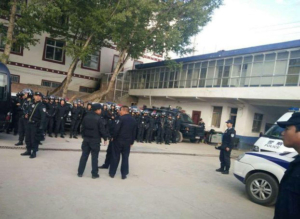Tibetan Anti-Mine Protesters Assaulted, Beaten in Gansu
Police in northwestern China’s Gansu province attacked a group of Tibetan villagers at the beginning of June after the Tibetans, residents of a township near a sacred mountain, protested the mining of gold at the site, according to a Tibetan exile source.
The Tibetans had gathered at Khelpa village, Amchok township, in Gansu’s Sangchu (in Chinese, Xiahe) county on June 1, Amchok Yonkyab, a resident of France, told RFA’s Tibetan Service.
“But a large group of armed paramilitary police arrived in the town at around the same time, and there were arguments and clashes between the security forces and the Tibetans,” Yonkyab said, citing local sources.

Chinese paramilitary police deploy in Amchok township, Gansu, June 2, 2016.
Photo sent by an RFA listener
“Six of the protest leaders were beaten, one so severely that he was rushed to a hospital in the provincial capital Chengdu, while the other five were taken to a nearby military hospital,” Yonkyab said, naming two of the five as Tsewang Kyab of Amchok’s Angon village and Gogen of Pung village.
Residents of Amchok’s eight villages later gathered on June 4 in an open area to burn incense and carry on their protest against the mining on Gong Ngon Lari mountain, Yonkyab said.
“Many armed police arrived at the site and surrounded the Tibetans, and tensions began to build. But on the advice of senior religious figures who were present, the Tibetans abandoned their protest.”
The six protesters who were beaten were then released from hospital on June 5, he said.
Frustrated appeals
The protest in Amchok began on May 31 and followed 15 years of frustrated appeals to authorities to halt the mining on the mountain, which has been regarded for generations as a sacred site by the township’s cluster of eight villages, one local source told RFA in an earlier report.
Two years ago, more than a hundred Tibetan residents of another Sangchu county township protested the seizure of farmland for the construction of roads tied to state-linked gold mining and industrial operations, sources said in earlier reports.
The April 2, 2014 protest by banner-carrying residents of Hortsang township came two weeks after other local demonstrations against government seizure of Tibetan land, and quickly drew police to the protest site.
Tibet has become an important sources of minerals needed for China’s economic growth, and Chinese mining operations in Tibet have often led to widespread environmental damage, including the pollution of water sources for livestock and humans and the disruption of sacred sites, experts say.
Reported by Palden Gyal for RFA’s Tibetan Service. Translated by Karma Dorjee. Written in English by Richard Finney.


comment 0